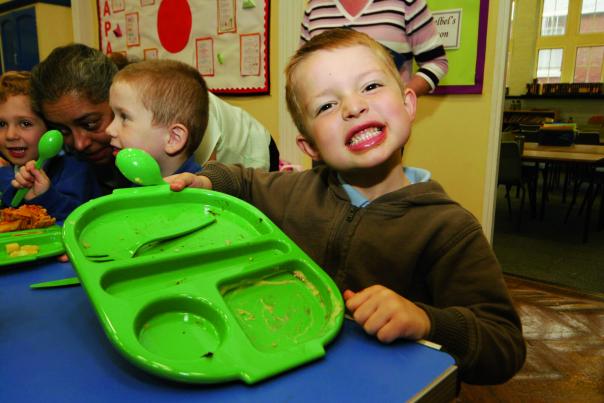
At first glance, a government initiative such as this can seem to be a great idea because most of us know that childhood obesity is a growing problem and that good nutrition habits among the young are vital to the future health of our nation.
Wanting our young people to have the chance to eat well every day is an aspiration we all share.
But we are talking about a £600million outlay here – a monumental amount of money – with a highly dubious return on investment.
According to what is being said, this initiative will give parents of every infant in the land a saving of £400 a year. That’s the same amount for every parent, including middle and high-income earners who can well afford to pay for their children’s food.
So should the government give money to a vast number of people who don’t really need it? There have been schemes of this kind before to show that school meal uptake is not just about cost. In Scotland and Hull these schemes did not deliver 100% take-up rates. In both instances, the rates stayed between 60 and 70%.
So if cost is not the only issue, we have to conclude that most of this new outlay will be money wasted.
This blanket funding has echoes of the 1950s. Back then, it was very much about ‘one policy fits all’.
Since the unveiling of the School Food Plan, the talk in the media has all been about “feeding” – putting “hot, healthy meals” in front of young people each day, but there has been little or no mention of educating them.
And where school food is concerned, real progress depends on the recognition that these two things are inseparable.
There is a lot of anecdotal evidence that children do better at school when they are eating well. But I think school caterers should be about more than just putting meals in front of children – they should be educators, too.
Education today is now more individualised than ever before. Schools put a lot of work into identifying and meeting individual learning needs.
Schools have recognised that students have different styles of learning, so their education should be tailored accordingly to help them learn.
If we want to implement the food education ideals contained in the School Food Plan, this is how we should be thinking as well. It’s exciting to think what might be achieved if this £600-million sum was shared among all the primary schools in the country, and spent addressing the nutritional or food education issues of children in most need of support.
We all want our children eating healthy and knowing how to choose and cook good food. But how do you best achieve this? By imposing this from on high or by growing organically, from the ground up?
In my experience, true food education happens when kids start to get excited about food; when they begin to love it, they also want to know more and, in turn, they become more involved.
For a fraction of the money currently being pledged, the government could install a trained chef in every single primary school in the land so that each primary school child could choose from a range of fresh, high-quality meals cooked from scratch on site every single day.
As well as bringing an appreciable boost to the economy in terms of around 16,000 new jobs, schools would be feeding every primary school child every day, and they would also be handed a golden opportunity to educate them about food.
This is exactly how my company has built its business success. We start to bring dramatic turnarounds in school meal uptake when the children find the food attractive.
You can’t expect to sprinkle fairy dust over problems and get instant results – that’s not how true education happens. We achieve our results in relatively quick time, but they only come because we use a ‘sow-and-grow’ approach in order to engender a love of healthy eating.
I am uncomfortable with the new free school meals announcement because it doesn’t seem to recognise that we are dealing with complex issues. Complex problems need complex solutions.
I am all in favour of targeting money to help address clearly identified problems, but this carpet-bombing of money across the entire country won’t, in my opinion, do a huge amount to help move things forward.
I shall watch with interest to see what new benefits emerge from this free school meals initiative. One good thing that has already occurred is vigorous debate, which in turn could result in some more enlightened policy-making.